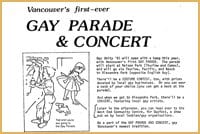As the Vancouver Pride Society (VPS) prepares for next year’s 30th annual Pride parade, at least one community member is questioning its numbering system.
The VPS listed the 2007 Pride parade as the 29th, but longtime queer activist David Myers claims the first gay parade did not take place until Aug 1, 1981 —making this year’s parade only the 26th, not the 29th as claimed.
Myers recently attended a panel discussion about Vancouver’s queer history and was dismayed when nobody could recall the date of the first Pride march. “I was in the audience and was like, ‘I was there, what year was it?’ So I dug up my papers and went back and dug through them and among other things I came up with a poster.”
The date on the poster led him to question the VPS’ assertion that next year will mark Vancouver’s 30th annual Pride.
The VPS’ 2006 media kit credits the late gay activist Malcolm Crane with organizing Vancouver’s first Pride parade in 1978. But the poster Myers is referring to advertises “Vancouver’s first-ever gay parade & concert” for Aug 1, 1981 at Nelson Park.
“It wouldn’t have been a ‘Pride’ parade if you like,” says Ron Dutton, curator of BC’s Gay and Lesbian Archives, referring to the Nelson Park event. “But it was a Gay Unity Week parade and it was the first gay parade in Vancouver.”
The Aug 2, 1981 edition of the Vancouver Sun estimates 1,500 people attended Vancouver’s first Gay Unity parade. “But they weren’t protesting or demonstrating as much as having fun and enjoying the festivities,” reads the article.
Future NDP premier Mike Harcourt, who was elected mayor of Vancouver in 1980, made good on a campaign promise to sign a civic proclamation declaring Aug 1-7, 1981 Gay Unity Week, the article notes. In 1980 his predecessor Jack Volrich and council voted against the proclamation.
“[The proclamation] was up on the wall at the Centre for the longest time,” says transsexual activist Jamie Lee Hamilton, who marched in the first gay parade.
Bill Siksay, NDP MP for Burnaby Douglas, was the University of BC’s gay representative to the Pride organizing committee in 1981. “We talked about why we did it during the long weekend in August and not around the anniversary of Stonewall like other Pride marches,” he recalls.
“It was explained to me that it was the same weekend of the longest-running gay event in Vancouver, which was said to be the Greater Vancouver Native Cultural Society’s ball, and there was a real strong sentiment that we stay with the weekend in August.”
The parade, which covered only one side of the street while the other remained open to traffic, ran from Nelson Park to Alexandra Park via Thurlow, Pacific and Beach.
“My partner Brian and I had a Great Dane and the traffic was going really slowly,” says Siksay. “One of the cars had these four young guys in it. One of them yelled out ‘Is the dog gay, too?’ to which I replied, ‘Why, no, she’s a lesbian!’ They were confused by that, which made me feel victorious.”
VPS president John Boychuk says this year marked the 29th anniversary of celebrating the gay community’s Pride —if not necessarily its parade.
“We’re looking at 29 years of continuing to hand down information from previous years,” he says. “Records over the years have got scattered and broken as people move from offices and apartments, so some of the records of the society have been lost. From my understanding, these people who started things up, Gary Penny, Malcolm Crane, Terry Wallace were all together as business owners to see that celebrations would continue year after year.”
But according to Don Hann, Vancouver’s earliest Pride celebrations began 34 years ago when the Gay Alliance Towards Equality (GATE), of which he was a member, organized a picnic in Ceperley Park and an art exhibit. The August 1973 edition of GATE’s newspaper, Gay Tide, features coverage of “Gay Pride Week ’73.”
Discrepancies in Vancouver’s Pride parade numbering surfaced in the 1990s. In 1995, Xtra West reported the parade as the “18th annual gay pride parade;” in 1996 it was the 19th; in 1997 it went back to the 16th parade; and in 1998 both Xtra West and the Vancouver Pride Society prominently listed it as the 20th Pride parade.
“I didn’t pick the numbering system,” explains Boychuk. “People who have been acquainted with the VPS for the last 10 years felt that was an accurate numbering and so it’s just been passed down. I’m putting on fresh wheels every year but the wagon stays the same.”
Dutton claims this was an issue around the time of the “20th” Pride parade. “They hired a historical researcher to come in here,” he says. “I told her that it was not the 20th anniversary and I even showed her the files, but she went back and gave them the date they were looking for.”
Hamilton believes some people might be confusing the first gay parade with an earlier gay festival.
“There was a Gay Unity Week in 1977,” she explains. “That was out at this farm in Langley owned by George Patey and Bill, his partner,” she says. “They had this huge land out there and they had forests and trails and we took buses from downtown. There were these games, a barbecue, entertainment. It was fabulous!”
The Aug 2, 1978 edition of the Vancouver Sun published an article about Vancouver’s second annual Gay Unity Week, which ran from Aug 2-6. According to the Aug 16, 1979 edition of the Westender, the third annual Gay Unity celebration, a picnic in Mission, was attended by over 700 people.
“It’s important if you’re going to say it’s going to be the 30th anniversary parade, it should be the 30th anniversary,” says Myers.

 Why you can trust Xtra
Why you can trust Xtra


